Will April showers bring May tree protections?
Friends and Neighbors,
I hope you are enjoying the warmer spring weather as we approach the end of April. In this month’s newsletter, please click on the links below to zip to the sections that interest you the most:
Please click on the links below to zip to the sections that interest you the most:
- District 4: Clean-up in Roosevelt; Community Center Opening at Magnuson, Mixed-use Project Coming to Wedgwood; Speaking at the Fremont Neighborhood Council, Boba Fest Celebration in U District; Safety Walk in University Park; Crime Prevention Tips Organized by Hawthorne Hills / View Ridge.
- Public Safety and Homelessness: Addressing the Fentanyl Crisis on Seattle Streets; Before the Badge Dialogues; Improving the Plan to Reduce Homelessness.
- Taxes and Budgets: Recent Poll Confirms Seattle Resident Concerns about Taxes; Explaining Seattle’s Tax Revenues; Questions about Mayor’s Proposal to Triple the Property Taxes that Help Create Low-Income Housing; and Take Our 2-Question Survey!
- Land Use Policies Impacting Seattle: 61 Amendments to the Mayor’s Tree Legislation; State Politicians Hand Financial Victory to Developers.
- Transportation & Seattle Public Utilities Committee: Vice President Kamala Harris Boosts Bridges (but Seattle not ready); Ship Canal Water Quality Project Update for Wallingford; A Glorious Transportation View Outside District 4.
- Providing Input.
For my previous newsletters, you can CLICK HERE to visit my website / blog. Thank you for caring enough to demand better from City Hall.
DISTRICT 4
Roosevelt Neighborhood Annual Clean Up
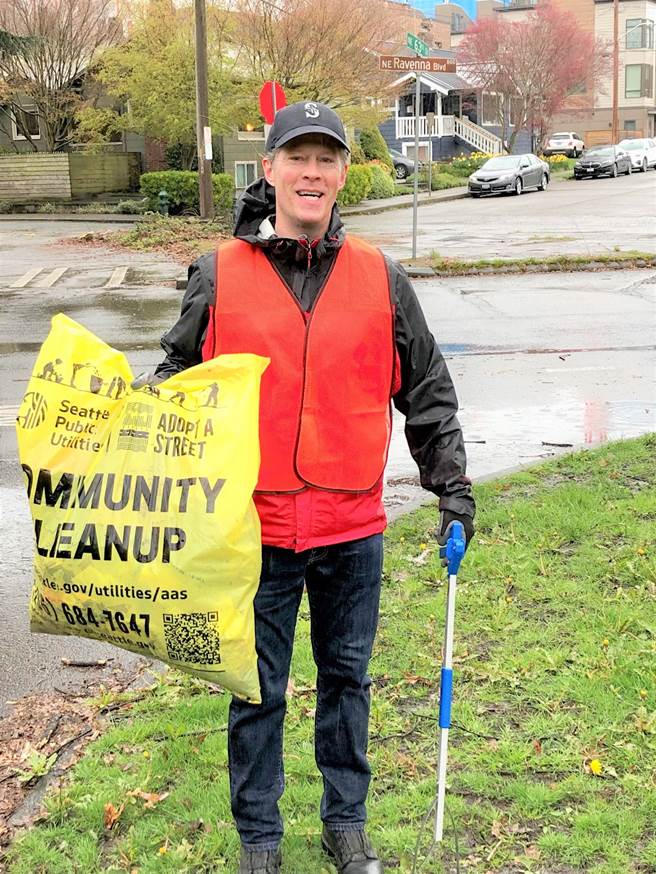
Councilmember Alex Pedersen soaked by Seattle showers with his fellow cleanup volunteers on April 16, 2023. Many thanks to Mike Nash from the Roosevelt Neighborhood Association for organizing this annual event again. Mike complimented the Seattle Public Utilities team that provided the tools and logistics he needed for this “Adopt-A-Street” event, which was actually a full-scale neighborhood clean-up with 15 volunteers from I-5 to Cowen Park and from NE Ravenna Blvd to NE 68TH Street. Councilmember Pedersen was humbled to be working alongside a neighbor who had served Seattle as a nurse at Harborview for 30 years — from the AIDS epidemic to the COVID pandemic! To get more involved in your neighborhood, contact your community council or organize a neighborhood cleanup yourself by contacting Seattle’s Adopt-A-Street program (CLICK HERE, email adoptastreet@seattle.gov, or call 206-684-7647). In addition, there will be another annual “Day of Service” organized by the Mayor’s Office on Saturday, May 20, 2023.
Magnuson Park Community Center: Finally Re-Opening
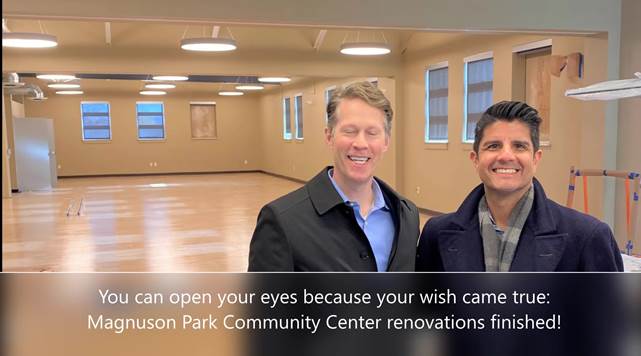
Councilmember Alex Pedersen with newly confirmed Superintendent of Seattle Parks & Recreation AP Diaz at the Magnuson Park Community Center earlier this year.
The Magnuson Park Community Center is finally reopening after a renovation that includes adding new community space for activities. As reported by the Parks & Recreation Department on April 23, 2023, “Major Construction is complete! Staff is moving in and the contractor is completing the final touches. The Community Center had a soft opening April 10th to get up and running and prepare for summer 2023 programming. We will participate in a community event at the park on July 6 and celebrate the Grand Reopening! We look forward to sharing this beautiful renovation and two new exhibits by Friends of Magnuson Park. This project builds out the south wing of Building 47 to allow greater programming capacity for Magnuson Community Center. It also makes accessibility improvements to the parking, entry, and lobby of the community center.”
Magnuson Park is home to more than 850 low-income residents, making this community center vital for the enjoyment, connections, and health of our neighbors.
To learn more about the renovation of the Magnuson Park Community Center, CLICK HERE.
Wedgwood Shopping Center Project Planning
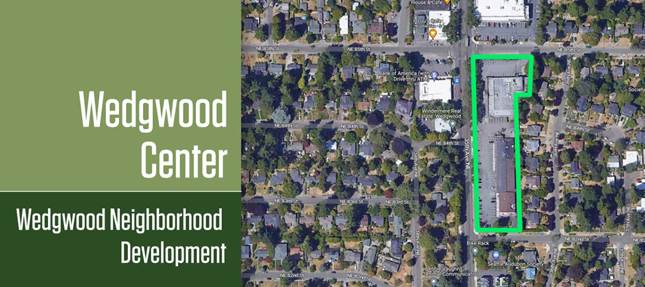
The Wedgwood Community Council again hosted the local real estate developer that has big plans to construct a 5-story housing project with street-level retail and underground parking, anchored by a new grocery store on 35th Ave NE at NE 85th Street. That level of density is already allowed by the current zoning on that parcel.
Many constituents know I’m not shy about leveraging my former private sector experience to go toe-to-toe with real estate developers to maximize benefits to the public from new projects. But, frankly, Wedgwood couldn’t do much better than having Security Properties on this project. There are several advantages with Security Properties: (a) headquartered in Seattle (appreciation for and accountable to their hometown); (b) a national footprint, so they have extensive experience and have spread their investment risk; and (c) their business model is a long-term hold rather than “buy, build, then bye-bye.” Moreover, they have agreed to honor key requests: (1) listen carefully and communicate frequently to the neighborhood; (2) build out enough retail space to attract a grocery store AND enable all existing retail stores to return (though some will decide not to return); and (3) provide some affordable housing on site. Thus far, I believe they have gone above and beyond, despite City Hall recently watering down requirements for developers to seek public input on proposed projects.
The elephant in the room for many neighbors is, “What will happen to our Wedgwood Broiler?” While space will be provided for the beloved Broiler to return, that’s up to the owners of that small business and they have signaled they might not return. While it’s true that newly constructed buildings often cause permanent displacement by charging higher rents, which — along with the need to hibernate or relocate for 2 years of construction — make it hard for mom & pop (single location) businesses to survive, the owners of the Broiler simply might not want to keep it going :(. Stay tuned.
This big new project is a great reminder of why it’s a great time to get involved in your community council. To get involved with the Wedgwood Community Council (which meets on the 1st Tuesday evening of each month), CLICK HERE and for other Northeast Seattle neighborhoods, CLICK HERE.
More info
:- For the developer’s website of the proposed project, CLICK HERE.
- For the Wedgwood Community Council’s detailed announcement of their April 4, 2023 meeting, CLICK HERE.
- For the minutes of the November 2022 community council meeting with the developer, CLICK HERE.
- To provide comments directly to the developer, CLICK HERE.
Fremont Neighborhood Council (FNC)
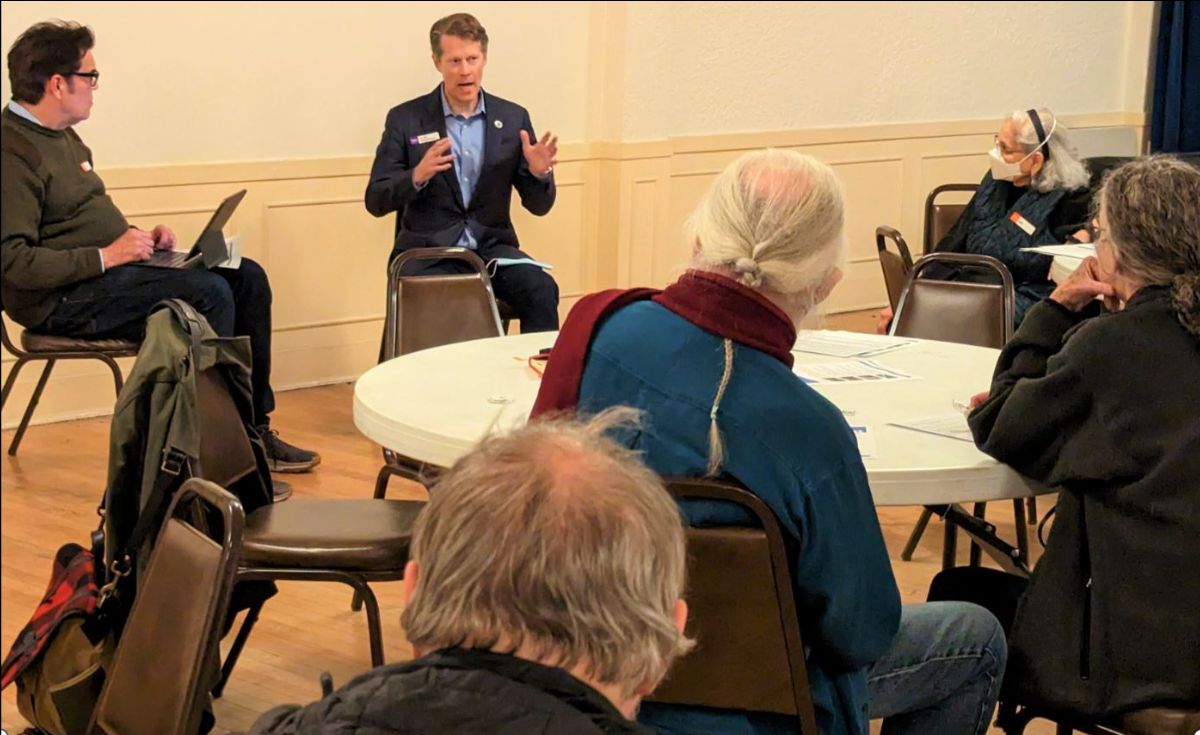
Councilmember Alex Pedersen was invited to the “center of the universe” to answer questions on local issues at the Fremont Neighborhood Council on April 24, 2023 (photo by A. Teeter).
I was honored to accept the invitation to speak at the annual in-person meeting of the Fremont Neighborhood Council (FNC) on April 24, 2023. While most of FNC’s participants reside or work west of my Council District 4, FNC’s geographic boundaries stretch east to include “East Fremont,” which is part of District 4.
Topics the FNC wanted me to discuss included the State’s expansive new land use policies, making sure developers build more low-income housing, protecting Seattle’s trees, preventing crime, and reducing homelessness.
FNC is one of the dozens of community councils across Seattle. To find the community council closest to you and to get involved, CLICK HERE.
BobaFest in the U District April 29
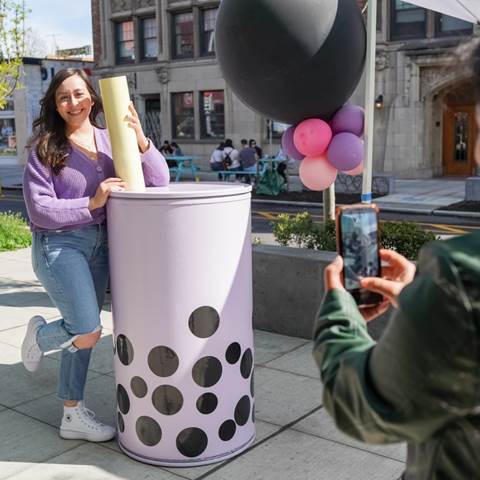
Boba with the best – only in the U District, Saturday, April 29, 2023. Photo from the U District Partnership.
Boba Fest is back! Get ready to slurp it up on Saturday, April 29, 2023, thanks to the U District Partnership, the nonprofit manager of the Business Improvement Area (BIA).
As highlighted on their website, “Come to the U District to celebrate National Bubble Tea Day on Saturday, April 29 from 12pm to 6pm! Festivities kick-off at noon with over twenty-five participating businesses offering a wide array of traditional and exotic bubble tea flavors as well as a variety of bubble tea inspired items! This event is organized by The U District Partnership to celebrate Seattle’s boba culture and our city’s highest concentration of bubble tea cafes and restaurants, here in the U District.”
For more about Boba Fest, CLICK HERE.
UW Student Safety Walk
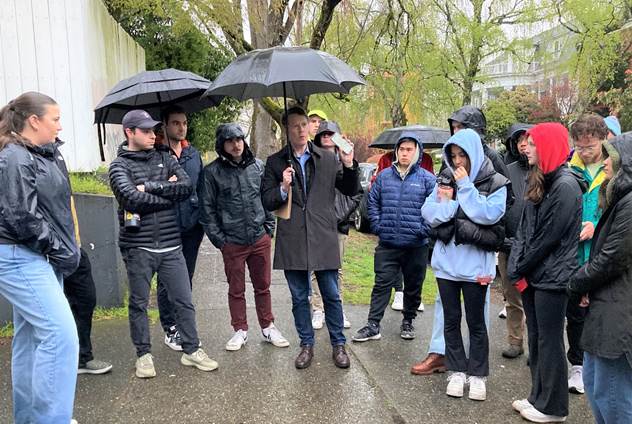
Councilmember Pedersen invokes a little-known umbrella exemption, which allows a Seattleite to use an umbrella during neighborhood safety walks when also showing one’s cutting-edge knowledge of a smartphone. Seriously, though, here is Councilmember Pedersen participating in a UW neighborhood safety walk organized by several thoughtful UW student leaders in April who want the City to do its part to reduce crime in the University Park neighborhood just north of the main campus. The Councilmember was encouraging the students to use the ”Find It, Fix It” app on their phones in addition to contacting City departments directly and calling 9-1-1 for emergencies. Thanks to the various UW officials and City departments who joined Councilmember Pedersen in responding to the students’ call to action: Seattle City Light (improving street lighting), Seattle Public Utilities (removing illegal dumping), Seattle Police Department (catching bad guys), and the Seattle Department of Transportation (fixing dangerous sidewalks and replacing missing street signs). We are connecting student leaders to other City departments as well, including the Parks Dept (maintaining the median strip along 17TH Ave NE) and Seattle Department of Construction & Inspection (citing owners of empty buildings that attract illegal behavior).
Hawthorne Hills / View Ridge Safety Meeting May 3
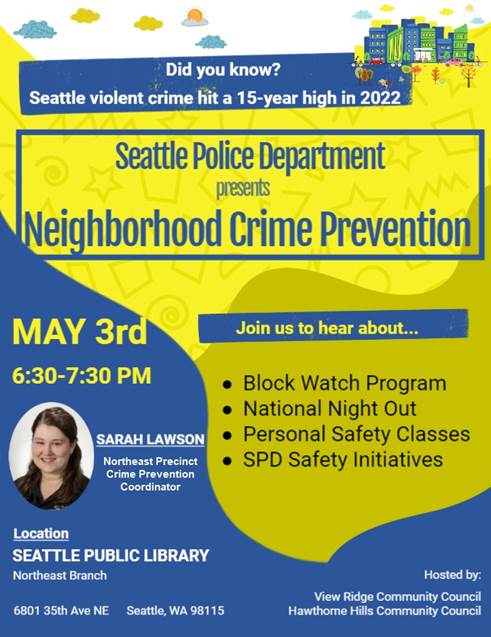
The Hawthorne Hills Community Council and the View Ridge Community Council are organizing a crime prevention tips meeting on May 3, 2023 from 6:30 p.m. to 7:30 p.m. at the Northeast branch of Seattle Public Library. Hear from one of our city government’s expert Crime Prevention Coordinators, an important civilian position for which my office secured funding back in 2021.
SAFETY AND HOMELESSNESS
Fentanyl Crisis: Seattle Must Discourage Illegal Drug Use in Public and Encourage Treatment
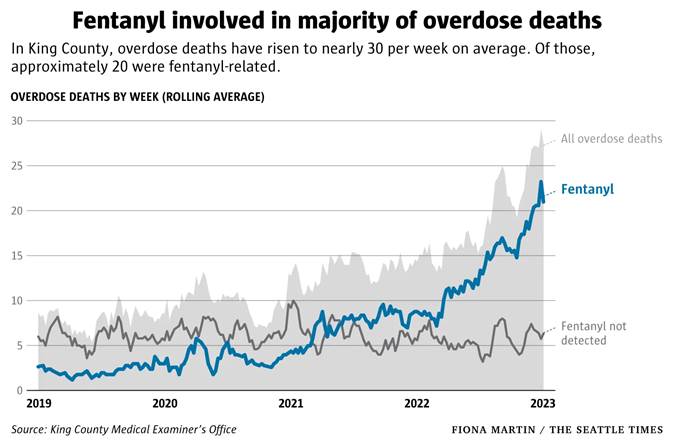
Nine months after another crisis was officially declared by local politicians — this time for the illegal, inexpensive, highly addictive drug fentanyl — we have seen many words, but few results – except for more deaths. In 2022, more than 1,000 people died by overdosing in King County, with 70% dying from fentanyl. In contrast, federal and regional efforts have recently achieved impressive results by disrupting illegal drug supply chains, which I supported in my previous newsletter. To do their part, the City of Seattle and King County need to do more.
On April 17, 2023, Mayor Harrell issued a 3-page Executive Order to direct the police department to disrupt the sale and distribution of illegal narcotics. The police should already be doing this but, due to City Hall sending mixed signals to SPD, it’s helpful for our city’s chief executive to communicate how SPD should focus its understaffed resources. I concur with Seattle Times columnist Jon Talton who concluded, “The executive order on fentanyl was a little softer and more general than I would have preferred, but credit goes to the mayor for forcing attention onto a major public health crisis. (And we need the county to step up, too.)”
Although politically and strategically it makes sense for the mayor to focus initially on drug dealers, it’s also important to leverage the possession and the use of illegal drugs as an opportunity to improve health and safety. But that means empowering our justice system do its part to discourage behavior that harms the public health and safety and leveraging that authority to encourage treatment. Our local government’s previous “look-the-other-way” approaches have failed and have been exacerbated by the King County Executive’s decision not to allow full use of the downtown detention facility — meanwhile public safety and public health have suffered.
After the controversial, divided ruling in February 2021 by the Washington State Supreme Court in State v. Blake, which said “unintentional” possession of illegal drugs should not be a felony, the Washington State legislature adopted later in 2021 an interim law (SB 5476) to make possession just a misdemeanor, with the suspect being offered treatment during the first two instances. This bill has been ineffective because addiction treatment follow-through is rare, and it’s been nearly impossible for the justice system to keep track of who had previous instances of illegal possession. Regardless, that interim law was set to expire July 1, 2023.
Enter State Senate Bill SB 5536 in 2023, which aimed to continue classifying illegal drug possession as a misdemeanor or gross misdemeanor, while tweaking how to enforce it and encourage suspects into addiction treatment, as needed. Unfortunately, the State legislature failed to adopt any legislation or the related treatment funding for this important topic impacting health and safety throughout Seattle. I believe our Governor should call a special legislative session to fix this and ensure there is at least a misdemeanor option in place statewide. Decriminalizing possession hasn’t worked well in Oregon (see the two April 13, 2023 articles from The Economist magazine by CLICKING HERE and HERE).
Until the State acts, local officials should do what they can to discourage public use of illegal drugs. For example, King County Councilmembers have already proposed a local law to discourage public use of illegal drugs in the unincorporated areas of King County, but that doesn’t cover Seattle. Smoking fentanyl and allowing the use of other illegal drugs publicly sends the wrong message to children and others, if they see government officials allowing such harmful illegal drug use on our public streets, sidewalks, and parks.
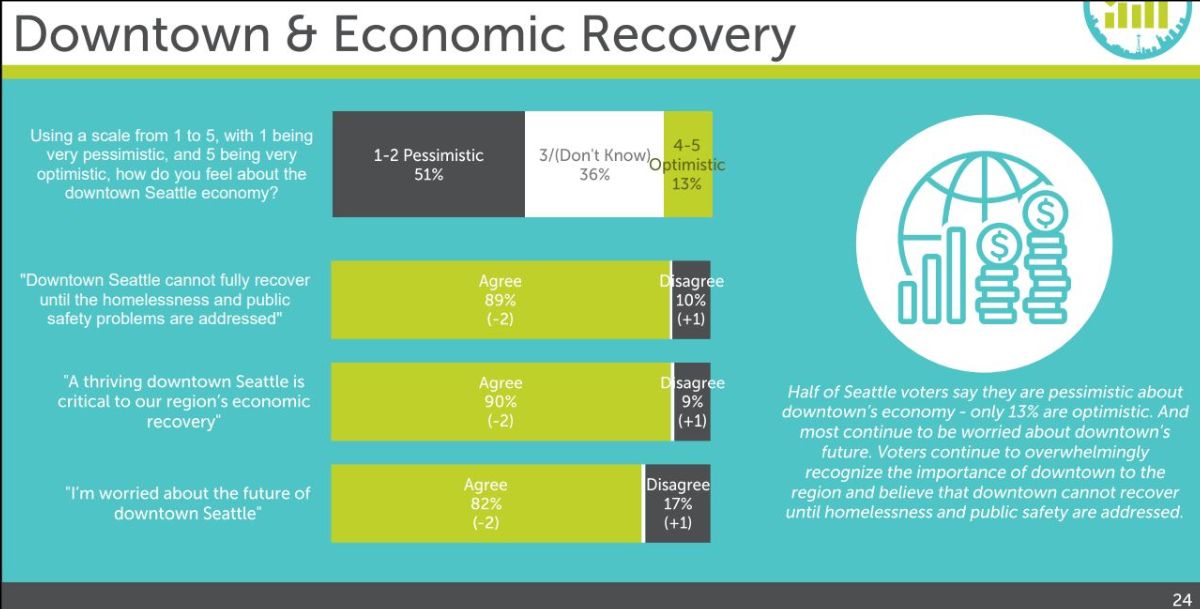
A recent survey by EMC Research shows nearly 90% of respondents believe downtown Seattle cannot fully recover until the homelessness and public safety problems are addressed. Discouraging the public use of illegal drugs can be part of the solution.
I am hopeful my colleagues will work collaboratively with our City Attorney’s Office to implement common-sense solutions to address any gaps left by the State legislature. (In Seattle, felonies are handled by the King County Prosecutor’s Office, whereas misdemeanors are handled by our City Attorney’s Office and the Seattle Municipal Court.) Our City Attorney Ann Davison’s approach – supported by a clear mandate in her election victory in November 2021 — has been more focused, thus far, on proactive solutions to increase community safety, which should ultimately improve public health outcomes. I look forward to her legal leadership on this public health and safety issue.
MORE INFO:
- For the Seattle Times April 16, 2023 article, “How fentanyl became Seattle’s most urgent public health crisis,” CLICK HERE.
- For Seattle Times columnist Danny Westneat’s recent concerns about State elected officials failing pass a replacement law in time, CLICK HERE (April 26, 2023). For his analysis of Bellingham’s tougher actions, CLICK HERE (April 12, 2023). For his December 3, 2022 column “Between prison and pamphlets: WA looks for an answer to the drug crisis, CLICK HERE.
- For Mayor Harrell’s Executive Order on fentanyl and initial pieces of his “downtown activation plan” from April 17, 2023, CLICK HERE.
- For the compelling editorial cartoon by David Horsey that visualizes the harm of doing nothing for people under the grip of illegal drug addiction (April 14, 2023), CLICK HERE. Mr. Horsey wrote, “In King County Drug Court, those in recovery talk about how they were hauled into rehab programs ‘kicking and screaming’ but are now grateful that the law coerced them into getting treatment. Not everyone needs the legal system to force them to get help, but some do. Which raises a question for those who favor getting rid of penalties for possession: With the number of overdose deaths in the state shooting higher and higher, is it truly compassionate to dispense with coercive options that might save some lives?”
Before the Badge Community Dialogue: North Seattle, May 1, 2023
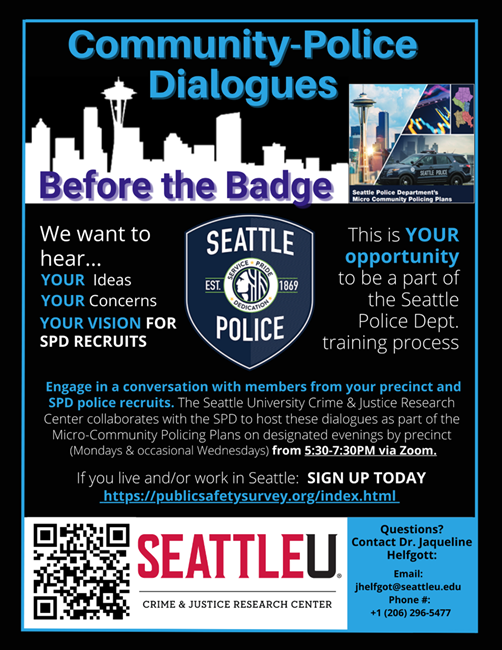
Seattle University wants you to know the Sign-up is open for the second series of “Before the Badge” Community-Police Dialogues. The North Precinct Dialogue is coming up on Monday – May 1, 2023. Sessions are on Zoom from 5:30 to 7:30 pm! Everyone who lives and/or works in Seattle is invited! These dialogues offer the opportunity for community members to meet with and engage in conversation with new Seattle Police Recruits who are completing the SPD’s 45-day “Before the Badge” training! To sign-up for one or more dialogues, go to: https://www.publicsafetysurvey.org/index.html
Revisions to KCRHA 5-Year Plan to Reduce Homelessness
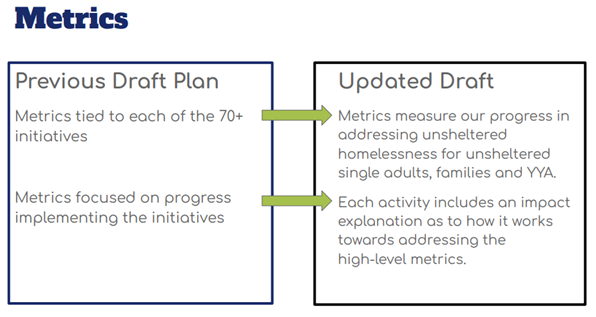
On April 27, 2023, KCRHA’s “System Planning Subcommittee” of the “Implementation Board” will meet again to discuss additional staff revisions to their so-called “5-Year Plan” to address homelessness. The initial revisions suggested by KCRHA staff and presented at that subcommittee’s March 23, 2023 meeting seemed minor and insufficient. On April 20, 2023, KCRHA staff provided a presentation to the Governing Committee hinting that bigger/better revisions are forthcoming. These latest revisions are likely to better prioritize existing funds, provide more specifics on short-term goals, and focus actions on a unifying, overarching goal: “to Bring Unsheltered People Inside as Quickly as Possible to Prevent Death and Further Harm.”
In my next e-newsletter (scheduled at the end of May 2023), I plan to offer my assessment of the revisions KCRHA staff recently proposed to their so-called “5-Year Plan.” The Implementation Board is scheduled to vote on the revised 5-Year Plan on May 10, 2023, and the Governing Board will have more time until June 1, 2023.
I believe it’s vital for the Governing Committee, which includes Mayor Harrell as well as City Councilmembers Lisa Herbold and Andrew Lewis, to weigh in early and assertively to make sure the problems with KCRAH’s draft 5-year plan are corrected. I believe they share a sense of urgency. Because Seattle is contributing the bulk of the funds and suffering the bulk of unsheltered homelessness, we should not be shy about requesting improvements to the sluggish pace of results and any inadequacies of future plans. I support this regional approach and want it to succeed, but that will take active engagement from that Governing Committee.
Seattle has seen several plans to reduce homelessness come and go. The fact is we don’t need to wait for yet another plan to reduce homelessness. City Hall needs to maximize the use of the 600+ vacant apartment units among 16,000 units subsidized by the City’s Office of Housing portfolio. With the Mayor proposing to triple the portion of property taxes that help create more low-income housing, it’s the perfect time to demand more frequent vacancy data and to have the organizations receiving those tax dollars accept more housing-ready individuals from tiny home villages and enhanced shelters who have been waiting for a permanent unit — so that we can then transition into shelter more people who have been suffering unsheltered in parks, greenways, and sidewalks.
More Info:
- For the draft 5-year plan from KCRHA staff, CLICK HERE, and for the April 20, 2023 update from KCRHA staff, CLICK HERE.
- For my initial (January 2023) critique of KCRHA staff’s initial 5-year plan (too slow and too expensive), CLICK HERE.
- For the concerns from the Seattle Times editorial board published on February 21, 2023 (focused on the unrealistic cost of KCRHA’s plan), CLICK HERE.
- For the excellent Op-Ed by Sharon Lee and Pastor Robert Jeffrey, Sr. published March 10, 2023 in the Seattle Times, CLICK HERE.
- To comment on KCRHA’s plan, CLICK HERE.
TAXES AND BUDGETS
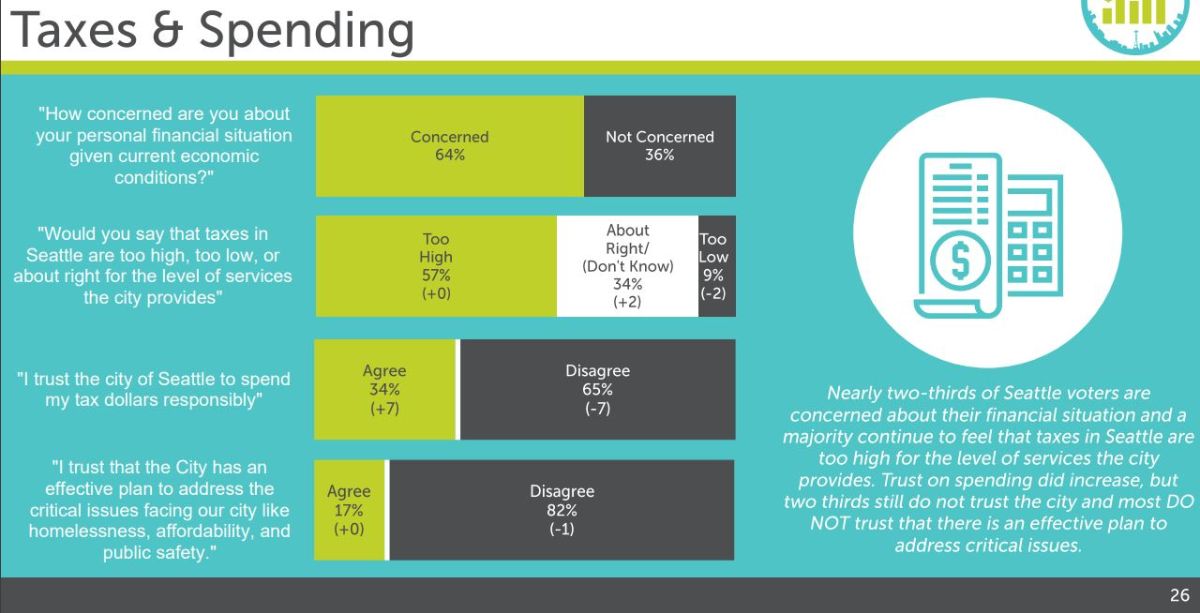
A new survey conducted by EMC Research asked questions about taxes and spending. A majority of respondents say Seattle taxes are too high and two-thirds of respondents said they do NOT trust City Hall to spend their tax dollars responsibly.
April Revenue Forecast: City Hall Can Still Pay the Bills, For Now
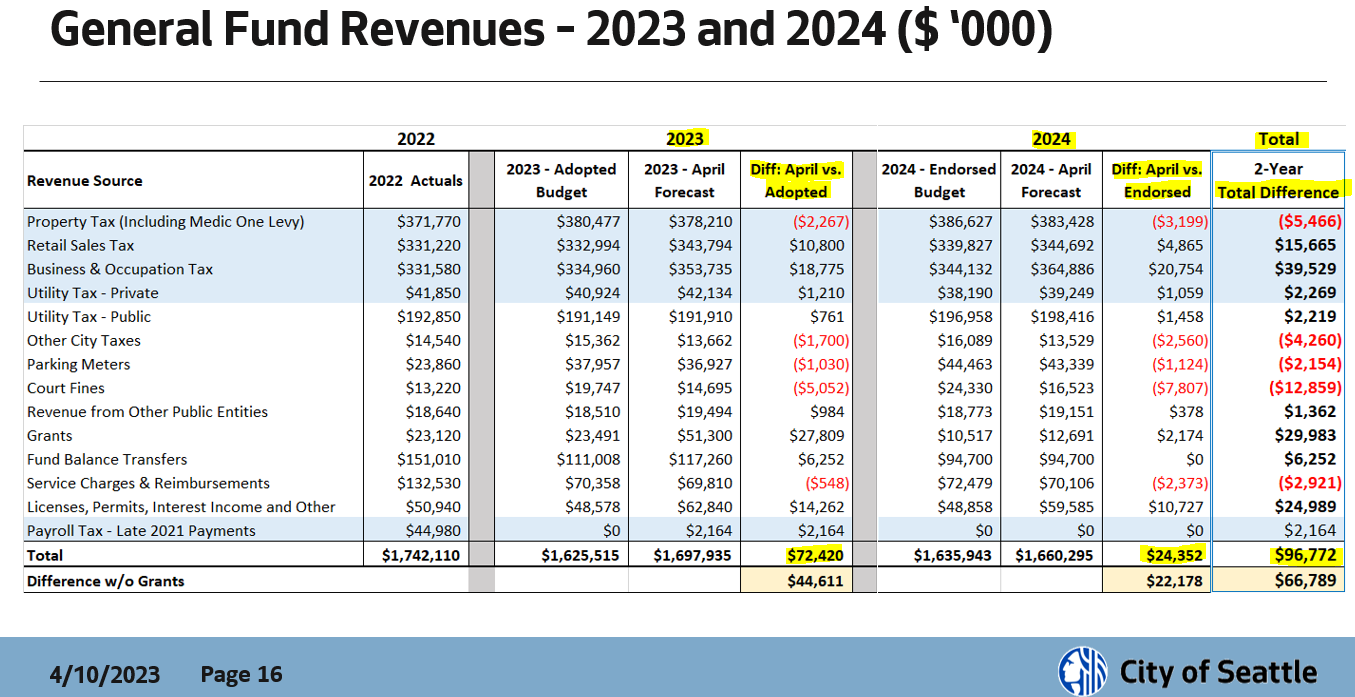
FORECASTING OFFICE: Your city government is likely to enjoy a small budget “surplus” at the end of this calendar year (2023), according to the revised estimates from Seattle’s Office of Economic and Revenue Forecasting. Earlier this month, the forecasting office presented its updated estimates for the revenues available to operate your city government and to deliver its services and programs. The relatively new forecasting office was wisely conceived by previous City Council President Lorena Gonzalez with Ordinance 126395, which I fully supported in 2021 to provide more transparency and accountability with the revenue estimates used by our budget policymakers. Instead of blindly relying on revenue estimates from the executive branch of government, the new office is governed equally by the executive and legislative branches. The forecast updated in April helps the City Budget Director (who reports to the Mayor) and the City Council Finance Committee to determine whether any mid-year budget adjustments are needed. The forecast updated in August helps the Mayor to finalize his budget request for the next calendar year. The forecast updated in November is used by the City Council to finalize its budget amendments and to ensure it will be in balance, as required by State law.
SMALL 2024 DEFICIT: You might hear of a small $6.7 million deficit (rounded to $7 million). To clarify, that’s over the two-year period (“biennium”) through 2024 and after subtracting grants that we receive from other levels of government for specific purposes (i.e. those grants are not cash that we can move around to plug holes in other parts of our budget, so it often makes sense to “exclude” them from the analysis). The negative $7 million is a logical number to highlight, and it’s good news, because it’s small relative to our total budget.
SURPLUSES: To show the bigger picture (and the existing “surplus”), I have combined and rearranged the revenue estimates (in the table below). You can see that, in 2023, our most flexible General Fund expects a surplus of $72 million. After combining the General Fund with the other funding sources (both positive and negative), we expect a net surplus of $34 million (including grants) and $6.6 million (excluding grants).
NEW REVENUE NEEDED? If we have a surplus this year, why did the Mayor and Budget Chair establish a “Revenue Stabilization Workgroup”? Good question! As city government personnel costs continue to increase at an unsustainable level, we expect larger deficits to return in 2025. But rather than going back to the well of the general taxpayer of Seattle, why not just better manage our costs? If that’s not possible, we know the Washington State Supreme Court recently allowed the State’s new capital gains excise tax to remain. Perhaps Seattle will consider a similar local measure here, although that could put Seattle at a disadvantage relative to other cities. Regardless, I believe City Hall should apply any new progressive revenue to reducing regressive taxes that we already pay, rather than spending it on additional costs of government. For example, if we introduce a new “progressive” tax in Seattle, we should use it to reduce the sales tax paid today by everyone (especially low-income residents) to boost our bus service and/or to reduce utility taxes that burden our electric and water bills, and/or to reduce the property taxes Seattle homeowners and renters pay to build low-income housing or large transportation projects.
KEEP MONEY FLOWING: With the surplus this calendar year, I believe there’s no need for the City Budget Office (CBO) to stall any investments already approved by City Council. When CBO took similar action a year ago to halt investments temporarily, it paused money for a cooling center at the NE Library and now we’re missing TWO summers to get that climate resiliency project completed. Earlier this year, the CBO held up money for important new positions, which ensnared the new City Urban Forester position needed as we consider a stronger ordinance to protect Seattle’s dwindling tree canopy.
TRANSPORTATION: The combined transportation funding sources are positive. In addition, I believe our revenues for speed enforcement cameras in school zones will increase IF the Harrell Administration gets SDOT and SPD to work together expeditiously to install the two dozen additional cameras the Council funded recently. Due to the lack of traffic enforcement in recent years and SPD’s shortage of officers in the field, increasing speed zone camera enforcement will be important to make progress on Seattle’s “Vision Zero” goals to dramatically reduce traffic fatalities and serious injuries.
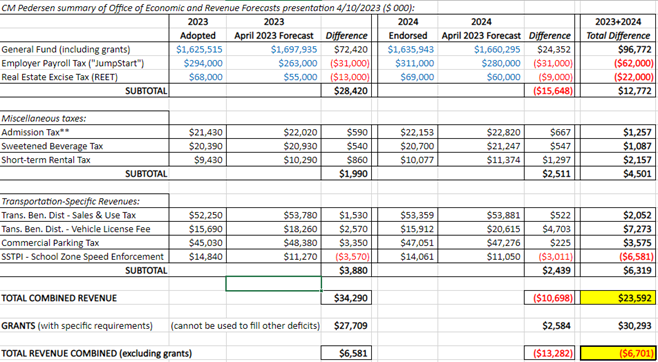
WHAT’S EXCLUDED? The revenues presented above include several of the most relevant locally controlled sources. Forecasting these revenues three times each year helps City Hall to track budget volatility. It’s important to note, however, that the revenues presented above exclude several other funding sources from our City’s total “all funds” budget, including dollars to and from Seattle City Light and Seattle Public Utilities, most funding sources for the City’s Capital Improvement Program, and the special-purpose property taxes for education support programs, low-income housing, library supports, and certain transportation projects.
For the forecast presentations from the Office of Economic and Revenue Forecasting, CLICK HERE.
Housing Levy: Tripling Those Property Taxes, But Where’s a Requirement For Vacancy Data to Help More People Experiencing Homelessness?

The Harrell Administration continued its sales pitch to broadly charge Seattleites nearly $1 billion (over seven years), by more than tripling the portion of the property tax used for the “Seattle Housing Levy.” Unlike some property tax levies, a benefit of the Housing Levy is that it produces tangible outcomes: new housing for low-income residents. The downside is that it increases the cost of housing for nearly everyone: landlords can pass along the increased tax to renters, both in apartment buildings as well as to small businesses renting their storefronts. The owner of a median priced home ($855,000) would pay $383 — which is $269 more per year than the $114 for the existing Housing Levy. When combined with the recent increase in the Parks District property tax ($176) and the Crisis Care property tax ($132), that means $577 more per year in higher property taxes imposed by your local government in just the past year.
For the grand total of property taxes increases, CLICK HERE for a recent, comprehensive analysis by our City Council Central Staff.
While the Harrell Administration spent many months conferring with the housing provider organizations to ask how much money they need, the City Council only kicked off its review process on April 5, 2023. Thus far, all nine City Councilmembers have indicated an interest in providing more funding to create additional low-income housing units. The questions on the table include, How Much? and How Many Units Should Be Created? I think we should also ask WHO PAYS? and HOW CAN WE MAKE THIS PROGRAM MORE EFFECTIVE? (See 2 survey questions below.)
Vacancies: To make the City’s Office of Housing program more effective, City Hall needs to maximize the use of the 600+ vacant apartment units among its 16,000 subsidized units. That’s too many vacant units. My experience nationally is that vacancy rates for low-income housing projects range from 0% to 3%, with higher cost markets like Seattle being on the lower end of that range. This is validated by national research: According to Moody’s Analytics, “The national vacancy rate for the affordable housing sector, which is comprised of Low Income Housing Tax Credit (LIHTC) markets, fell by 0.1% in the fourth quarter, finishing at 2.3%. Since Moody’s Analytics REIS began tracking this sector, the vacancy rate has remained within the range of 2.0% to 2.6%. It is expected to stay within that range for the foreseeable future.” A vacancy rate of 2.0% would be 320 available units.
With the Mayor proposing to triple the portion of the property taxes that create more low-income housing, it’s the perfect time to demand more frequent vacancy data and to have the organizations receiving those tax dollars accept more housing-ready individuals from tiny home villages and enhanced shelters who have been waiting for a permanent unit, so that we can then transition into shelter more people who have been suffering unsheltered in parks, greenways, and sidewalks.
SURVEY: Let us know what you think about getting effective data to maximize our subsidized housing and considering the use of financial sources other than property tax increases.
Take the 2-Question SurveyHere are the 2 SURVEY QUESTIONS:
(1) EFFECTIVE DATA: Before asking voters to triple the portion of your property taxes that help create low-income housing in Seattle, should City Hall require better data on vacant units and have organizations receiving those tax dollars accept more people experiencing homelessness during an emergency?
(2) WHO PAYS: Instead of tripling the portion of your property taxes that helps to create more low-income housing, should the City instead use a more progressive revenue source, such as a capital gains excise tax identical to our State’s new fee on NON-retirement income from selling stocks / bonds?
(Note: This new capital gains excise tax exempts retirement accounts and real estate sales and applies only to capital gains of more than $250,000. For Frequently Asked Questions about that excise tax, Click here.)
To take that 2-question survey, CLICK HERE or click on the green button above. Thank you!
More Info
:- For the original version of the ordinance as proposed by Mayor Harrell and his Office of Housing, CLICK HERE and for their accompanying Resolution, CLICK HERE. Note: These two pieces of legislation have not been put onto the City Council’s official Introduction and Referral Calendar (IRC) yet, so they are subject to change.
- For the schedule of City Council’s consideration of the Harrell Administration’s proposal to TRIPLE the property tax portion that goes toward Seattle’s (low-income) Housing Levy, CLICK HERE.
- For the Office of Housing presentation from April 5, 2023, CLICK HERE.
- For the Office of Housing presentation from April 19, 2023, CLICK HERE.
- For the property tax presentation from our City Council Central Staff, CLICK HERE, and for their memo, CLICK HERE.
- For information on property tax relief, CLICK HERE.
LAND USE POLICIES IMPACTING SEATTLE
Tree Protection Legislation: A Tsunami of 61 Amendments!

“I am the Lorax who speaks for the trees, which you seem to be chopping as fast as you please!”
“Unless someone like you cares a whole awful lot,
Nothing is going to get better. It’s not.”
-from The Lorax by Dr. Seuss
The fate of Seattle’s trees and their public health and environmental benefits depends on your City Councilmembers – will they amend the unhelpful legislative proposal from the Mayor’s Office to make it better for the general public and our tree infrastructure — or make it better for the profits of developers and tree cutters?
After removing a couple of substantive amendments from the Committee Chair’s proposed initial changes to the Harrell Administration’s “tree protection” bill (CB 120534), the committee “adopted” the Chair’s substitute bill with 11 technical changes to become the new baseline bill. Over the next three weeks, we will consider approximately 50 substantive amendments.
I’m very grateful to the efforts of the Central Staff of the City Council and our City Attorney’s Office, which have been working hard to translate multiple amendment concepts into effective legislative language for our consideration.
Out of the 50 amendments proposed thus far, I am proposing nearly half of the total, mainly to honor the work and input of the expert Urban Forestry Commission (UFC). Here are a few of the key amendments needed:
- Remove the 85% developer guarantee. The various other provisions in the tree protection ordinance should govern how we protect trees, rather than providing an arbitrary and blanket guarantee to developers. Let’s be sure to adopt a tree protection law, rather than a profits protection law. (Amendment A6).
- Require an Inch-for-Inch replacement of trees removed by developers, rather than allowing them to replace mature trees with “sticks.” (Amendment E4). For example, if a developer rips out a 24-inch diameter regulated tree, then they should replace it with six 4-inch diameter trees (6 x 4 = 24).
- Increase the In-Lieu Fee to a minimum of $4,000 per tree and memorialize that in the ordinance, rather than hoping a “Director’s Rule” does it later. (As noted during the committee meeting, the version originally published in the Central Staff memo — Amendment E6 — needs to be corrected / changed from $2,833 to $4,000, which would then make it consistent with the UFC letter from April 7, 2023).
- Empower the new City Urban Forester position created last year within the Office of Sustainability & Environment. (The initial draft of Amendment B4 needs to be beefed up.)
- Think Trees First: Add a new section to request that SDCI modify its practices to consider trees at the beginning of the permit review process — before any trees are ripped out. (Amendment C1).
- Protect the tree service provider registry law we recently adopted to increase transparency and accountability and end the “wild west” of tree cutting in Seattle. (Reject the content from amendment #10 originally proposed in the substitute bill. At my request on April 21, 2023, the Chair agreed to remove that provision — to be debated later. I would oppose watering down that law if it allows tree cutters to improperly remove Tier 3 and 4 trees or repeatedly submit incorrect information to the City department.
“The UFC is disappointed with the City’s policy development process relating to CB 120534. From the UFC perspective, the proposed legislation appears to have been developed behind closed doors without substantive participation by the Commission and other stakeholders. The March 2023 draft is substantially different from the February 2022 draft the UFC had seen last and made a substantial list of recommendations on. The timeline established by the City Council for acting on the proposal is relatively short given the complexity of the policy and the implications for our city. The UFC does not feel there has been adequate time for all interested stakeholders, including this Commission, to reflect and make well-informed recommendations.”
— from April 7, 2023 letter from Urban Forestry Commission
“City Council must heavily amend this tree legislation, because it’s supposed to be a tree protection bill – not a profits protection bill. It’s finally time to put up or shut up about wanting to advance the city’s public health and environment by protecting Seattle’s dwindling tree infrastructure urgently needed to survive climate change heat waves – and the amendments we choose to adopt will prove where we really stand.”
— Councilmember Alex Pedersen, April 25, 2023 quote in Seattle Times.
3 Ways to Raise Your Voice
:- Call into the Council Meeting: You can register online two hours ahead of each meeting. Then call in to be prepared to speak on your telephone when the meeting starts. For instructions on how to register and call in, CLICK HERE or use this website: http://www.seattle.gov/council/committees/public-comment
- Speak in person: You could also come to City Hall to speak in person. (Arrive at least a few minutes before his committee starts to complete the Sign-In Sheet.)
- Email: The email addresses of the members of the Land Use Committee are: Dan.Strauss@seattle.gov, Tammy.Morales@seattle.gov, Teresa.Mosqueda@seattle.gov, Sara.Nelson@seattle.gov, Alex.Pedersen@seattle.gov. To send an e-mail to all nine Councilmembers, you can use this single email address: Council@seattle.gov.
Current Schedule/Next Steps
: (items in bold indicate a change from previous calendar)- Wed, March 29, 2023: the five City Councilmembers of the Land Use Committee meet again on this tree protection legislation. For the presentations by SDCI, CLICK HERE (March 29) and HERE (March 22).
- Fri, April 7: Urban Forestry Commission finalizes its suggested amendments.
- Fri, April 7 at 2:00 pm: the five City Councilmembers of the Land Use Committee meet again to discuss this tree protection legislation.
- Tue, April 18: Internal deadline for Committee members to send proposed amendments to City Council’s Central Staff for finalizing.
- Fri, April 21 at 2:00 pm: Committee votes on Chair’s proposed substitute bill with “technical” amendments. (For that agenda and its supporting materials, CLICK HERE).
- Mon, April 24 at 10:30 am: public hearing
- Wed, April 26 at 2:00 pm: Land Use Committee votes discusses the substantive amendments.
- Thurs, May 4 at 9:30 a.m. and 2:00 p.m. Votes on amendments and then votes amended bill out of Land Use Committee.
- Tue, May 9 or 16 at 2:00 pm: full City Council is likely to vote on the bill (Be alert for late-breaking amendments from the four Councilmembers not on the Land Use Committee.)
LEGISLATIVE LINKS
:- For the substitute baseline bill that incorporates technical changes approved by the Land Use Committee April 21, 2023, CLICK HERE. For the related fiscal bill (CB 120535), CLICK HERE.
- For the Committee agenda with supporting materials, including the 62-page City Council Central Staff memo with the Chair’s proposed substitute baseline bill (with 13 mostly technical amendments) — PLUS the list of 48 potential other amendments to the Harrell Administration bill, (after page 54 of the memo) — CLICK HERE.
- To watch the video of the April 21, 2023 Land Use Committee, CLICK HERE.
- To compare the March 7, 2023 (Harrell-Strauss original version) to the Feb 2022 (Durkan-SDCI-SEPA version), CLICK HERE. Is the new version stronger for trees? Review the comparison and decide.
- For the 4-page Executive Order issued by Mayor Harrell on March 7, 2023, CLICK HERE.
- For the draft Director’s Rule for proposed In-Lieu Fees, CLICK HERE.
- For the draft Director’s Rule listing the “Exceptional Trees” now called “Tier 2 Trees,” CLICK HERE.
- For the 18-page “Director’s Report,” that explains some of the proposed changes, CLICK HERE.
- For a 4-page “Expanded Summary of Code Changes,” CLICK HERE.
- For their joint March 2023 press release announcing their bill and executive order, CLICK HERE.
OTHER COMMENTS
:- For an April 21, 2023 televised debate on Seattle Channel about this issue between developer lobbyists and tree advocates, CLICK HERE.
- For the South Seattle Emerald Op Ed “We Must Get Seattle’s Updated Tree Ordinance Right to Protect Community Well-Being” by Lois Martin and Sandy Shettler, April 17, 2023, CLICK HERE.
- For link to the Seattle Times editorial published April 25, 2023 urging the Council to pass key amendments to the Harrell Administration’s initial proposal, CLICK HERE.
- For my ongoing blog posts about protecting trees in Seattle, CLICK HERE.
State Politicians Enable “Christmas in April” Profits for Condo Developers by Pre-Empting Seattle Land Use Process

With their adoption of State House Bill 1110, your State politicians of both political parties, in effect, created massive financial benefits for condo developers by trumping local decision-making and imposing their own statewide land use expansions. In Seattle this means that, where there has been a single house or a house plus two accessory dwelling units, a developer can build 6 units. Allowing for more units could have been a positive change — if Seattle had been allowed to have its own local decision-making process, and if the new policy required inclusionary zoning for low-income housing (because we cannot rely on the private market to altruistically build the type of affordable housing we need). In most locations, however, the State bill fails to require affordability, which means Seattle must proactively extend its Mandatory Housing Affordability requirements to these new State-imposed citywide upzones. With the State-imposed increase in density capacity, developers should be able to double their profits. This legislative gift from State politicians to condo developers weakens the claim of builders who say stronger tree protections or transportation impact fees in Seattle will harm them.
In fact, the State giveaway enabling developers to build more to make more money injects greater urgency into Seattle’s need to follow-through on its promises to protect its dwindling tree infrastructure, which is vital for public health and environmental benefits in the midst of climate change heat waves.
KITTY KARMA:
Admittedly, my newsletters are not completely balanced, because I have opinions (formed ideally after conferring with constituents). Last month’s photo of the adorable doggie was clearly lopsided toward canines. Therefore, in a bow to balance, I give you the following Kitty Karma…

This fuzzy feline was actually found and delivered to our City’s Animal Shelter. So, if you recognize her, CLICK HERE to contact Animal Shelter and claim your kitty!
TRANSPORTATION & SEATTLE PUBLIC UTILITIES COMMITTEE
(This is the Committee currently chaired by Councilmember Pedersen, so we provide extra information on its issues.)

To distribute the workload of city government, each of the nine Councilmembers chairs a committee. The Committee I chair (Transportation & Seattle Public Utilities) meets on the 1st and 3rd Tuesdays of each month at 9:30 a.m. at City Hall (and on Seattle Channel), except during the two-month budget review season in October and November.
VP Kamala Harris Boosts Bridges with Dollars and Results; Seattle Leaders Should, Too
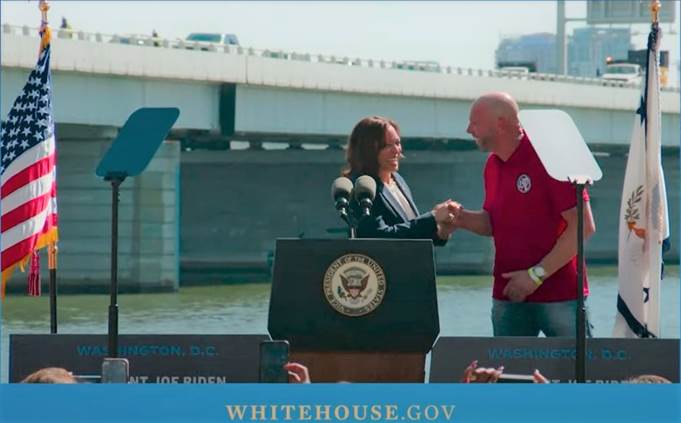
Vice President Kamala Harris, with the 14th Street Bridge in D.C. in the background ready for repairs, thanks the local Ironworkers union for their role in building and repairing bridges in and around our nation’s capital.
Reinforcing the themes raised by U.S. Dept of Transportation Secretary Pete Buttigieg in 2021 to “Fix It First,” Vice President Kamala Harris stood in front of a key bridge in our nation’s capital this month to celebrate the increased bridge investments in cities from coast to coast.
“We are investing in a better future for our nation and this bridge is evidence of that progress…Every day more than 100,000 people cross [this bridge] to go to work, to go to stores, to visit loved ones, and to tour [our city]. Every day thousands of truck drivers cross this bridge on their daily route to deliver the food that fills the grocery stores and the products that fill our shelves. But here’s the thing: this bridge has gone without urgently needed repairs for decades…”
-Vice President Kamala Harris, April 2023
What about Seattle? Despite the great work that SDOT’s bridge crew accomplishes with its spot repairs, many are disappointed that SDOT officials decided not to apply for $100 million “Mega” federal grants while also rebuffing a separate $100 million in bonds authorized by City Council. It appears that SDOT is still struggling to get projects ready to strengthen our aging bridges, more than two years after our September 2020 audit exposed the poor condition of several Seattle bridges. Our problematic aging bridges include the University Bridge, Ballard Bridge, Fremont Bridge, Magnolia Bridge, 2ND Avenue South Extension bridge, and several others.
In addition to connecting our communities and keeping our economy moving in a city carved by waterways and ravines, the jobs we can create to fix bridges are well paid and don’t require an expensive college degree.
The D.C. Difference: The city government of D.C. was ready to apply for the largest grants and did. VP Harris was standing in front of a bridge receiving a whopping $72 million from the federal “Bridge Investment Program” (BIP) discretionary grants announced April 2023. That was the third round of bridge grants under the U.S. Infrastructure Investment and Jobs Act following the Bridge Planning Grants and the Mega Projects Grants.
Seattle proffers plenty of plans and pronouncements, but we need more nuts and bolts.
Note: Seattle received a federal “INFRA” grant in March 2022 (with funds from federal fiscal year 2021), but that was due to the emergency need to address the cracked and closed West Seattle Bridge. WSDOT also received an INFRA grant to rehabilitate the Salmon Bay railroad bridge in September 2022 with funds from federal fiscal year 2022.
Bottom line: SDOT should rebalance its priorities to care more for Seattle’s aging multimodal bridges, so that it is prepared to take full advantage of federal, state, and local dollars.
- For the video of Vice President Harris’s remarks at the D.C. bridge in April 2023, CLICK HERE and for the White House April 13, 2023 press release, CLICK HERE.
- I brought SDOT and our City Auditor to our Transportation Committee last month to update us on the status of Seattle’s bridges:
- For the presentation by our City Auditor on March 21, 2023, CLICK HERE.
- For the presentation by SDOT crafted in collaboration with the City Auditor for March 21, 2023, CLICK HERE.
Ship Canal Update: We Appreciate Wallingford’s Patience!
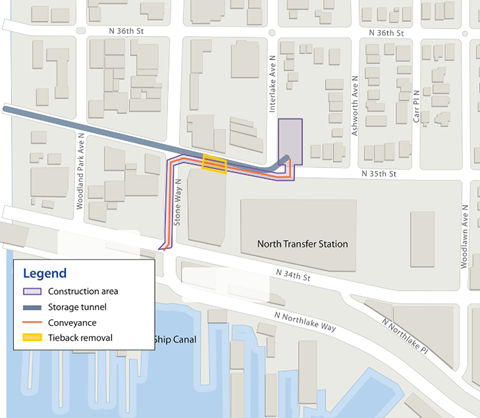
There’s no point in sugar-coating it: I agree the traffic congestion, sidewalk diversions, difficulties for cyclists, and parking shortages caused by multiple, simultaneous construction projects — including the government’s mega environmental project to install an underground stormwater storage tank — are causing logistical laments among many Wallingford/East Fremont residents and small businesses.
Regarding the City-County water quality control project led by Seattle Public Utilities, crews continue working on the electrical building and gate structure on Interlake Ave N and N 35th St as well as pipe installation within Stone Way N, between N 34th St and N 35th St to install pipes and perform other utility work.
In the coming weeks, crews will reopen westbound N 34th St. In the coming month, crews will move operations into N 35th St and the intersection between Stone Way N and Interlake Ave N. Seattle Public Utilities will share more details about the upcoming detour and traffic impacts as they become available.
For more on the City-County Ship Canal Water Quality Control Project, CLICK HERE.
The Best Transportation Views: Is It Okay to Cheat on Your District? [Water] Taxi!
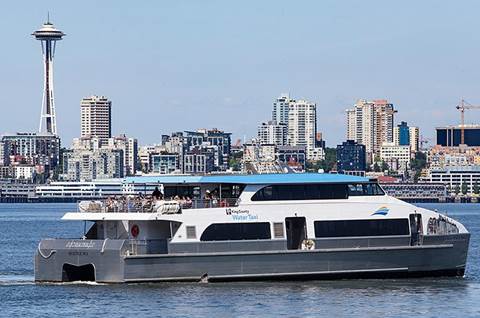
Of course, the West Seattle Water Taxi is not in our City Council District 4 in Northeast Seattle. But as Transportation Chair, I can be open-minded.
Similar to the easy, breezy Staten Island Ferry with breath-taking views of New York City, the West Seattle Taxi gets you onto Elliott Bay of Puget Sound for the best views of Seattle.
Here’s a truncated version of the announcement from King County: “The summer sailing schedule for the West Seattle Water Taxi begins April 17 and will run through Oct. 13…Daytime sailings for the West Seattle Water Taxi start at around 6 a.m. weekdays and 8:30 a.m. on the weekends. The midday service remains in place, but our summer schedule includes the return of late-night sailings through 11 p.m. on Fridays and Saturdays…”
“Enjoy a 15-minute ride across Elliott Bay while enjoying panoramic views of the Seattle city skyline, Mount Rainier, and the Olympic Mountains. Walk along Alki Beach or the downtown waterfront. And you’ll avoid the traffic of the West Seattle Bridge or paying to park downtown…In West Seattle, riders can take the free Metro water taxi shuttles to and from the dock at Seacrest Park. Route 773 serves the West Seattle junction. Route 775 serves the Admiral District and Alki…Adult fare is $5.75 one way ($5 with an ORCA card). Don’t have an ORCA Card yet, download the TransitGoTicket App on your mobile device for express boarding. This is the first summer where young people can ride the Water Taxi, and most regional transit, for free! Customers with lower incomes, seniors, and people with disabilities can now apply for an ORCA Regional Reduced Fare Permit (RRFP) card using the new Reduced Fare Portal. Grab your shades and get ready for a Water Taxi summer. We can’t wait to see you on board!”
For King County Metro’s full announcement of summer water taxi info, CLICK HERE.
While water taxi concepts to serve additional routes for Seattle have been studied in the past with different ranges of financial feasibility, I still think they can provide a future option for commuting, in case everyone wants to suddenly work in South Lake Union again.
WE WANT TO HEAR FROM YOU: Ways to Provide Input
“Find It, Fix It” App: updated user interface from Seattle’s Customer Service Bureau
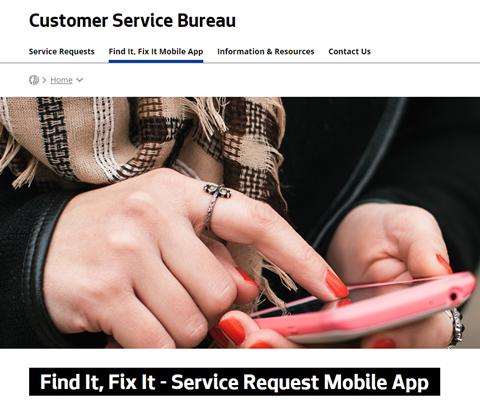
Your city government has made it a bit easier for residents to report an issue. New improvements launched in November 2022 to the City’s Find It, Fix It mobile app will make it easier to report an issue, track reports, and view your service requests on anything from a pothole to an abandoned vehicle.
City Council Meetings on the Internet
Viewing & Listening: You have a few options to view and hear Seattle City Council meetings. To view Council meetings live on Seattle Channel, CLICK HERE. You can also listen on your phone by calling 253-215-8782. To view the recordings of City Council meetings that have already occurred, CLICK HERE.
Our City Council meetings are held Tuesdays at 2:00 p.m. Even after returning to in-person meetings, the public will still be able to call in their comments at City Council meetings – this is an important upgrade for public input. I would have supported moving our main Council meeting to the evenings to make it easier for people with day jobs to visit us, but the technological upgrades now enable anyone to call into the public comment periods. Last year, we updated our City Council Rules and parliamentary procedures to improve the efficiency of the City Council by enabling Councilmembers to focus their work on city government business rather than on Resolutions on other issues such as international affairs.
Commenting: You can submit comments to me at Alex.Pedersen@seattle.gov or to all 9 Councilmembers at Council@seattle.gov. For the instructions on how to register and call in to a meeting, CLICK HERE. Sign up begins two hours prior to the meeting start time.
Meetings with Your Councilmember Pedersen: In Person Again!
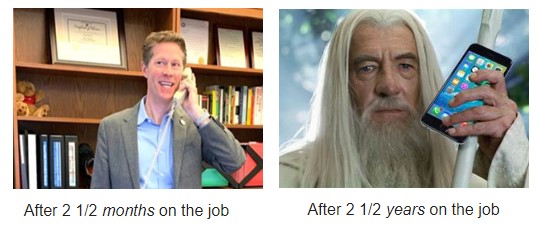
In-person office hours on most Friday afternoons are back to Magnuson Park’s Building 30 conference room at 6310 NE 74th Street, Seattle, WA 98115, just a couple of “blocks” into the park’s main entrance. You may continue to sign up through my website or by CLICKING HERE, so I can hear your ideas, concerns, and requests. You can also just send an e-mail to alex.pedersen@seattle.gov.
For previous e-newsletters, visit my blog by CLICKING HERE.
With gratitude,

Councilmember Alex Pedersen
Seattle City Council, District 4
Email: Alex.Pedersen@seattle.gov
Phone: (206) 684-8804
Find It, Fix ItPosted: April 26th, 2023 under Councilmember Pedersen
